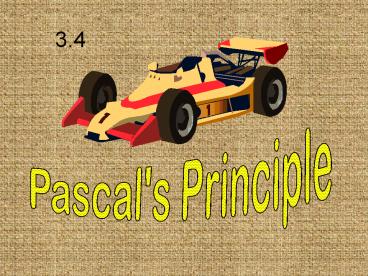Pascal's Principle - PowerPoint PPT Presentation
Title: Pascal's Principle
1
3.4
Pascal's Principle
2
Who is pascal
Blaise Pascal , (June 19, 1623, August 19,
1662, ) was a French mathematician, physicist,
and philosopher. Pascal's earliest work was in
the natural and applied sciences where he made
important contributions to the construction of
mechanical calculators, the study of fluids, and
clarified the concepts of pressure .
3
(No Transcript)
4
Experiment to verify the Pascals Principle
- When the piston is pushed into the glass sphere
the jet of water is shot out from the holes in
the glass sphere with the same speed. - This is because the pressure acting on the water
is transferred uniformly throughout the water.
5
(No Transcript)
6
RELATIONSHIP
- P F/A
- From pascals principle , P1 P2
F1 F2 A1 A2
7
USING PASCALS PRINCIPLE
8
Applications of Pascals Principle
- (1)Automobile hydraulic lift
9
hydraulic lift
Output Force
Input force
10
THINK!!!!!!!!!!!!
The figure shows a basic hydraulic lift that has
a small and a large pistons with cross-sectional
area of 0.5 m2 and 2 m2 respectively. A man with
the weight of 700N is standing on the small
piston.
Determine (a) The pressure transmitted in
the hydraulic fluid. (b) The mass of the
car (c If the small piston is pushed down
at a depth a 0.5 m, what is the distance moved
by the large piston.
2 m2
0.5 m2
11
40 kg
2000 kg
20 m2
What is the area of a piston where an elephant
is standing on.?
12
(2) Hydraulic Brake
13
2. HYDRAULIC BRAKE
14
THINK !!!!!!!!!!!!!!
Tennis ball
RETINA
OPTIC NERVE
- - -
- - - - -
Blindness occur as a result of tennis ball hit
your eyes
15
Tennis ball
RETINA
OPTIC NERVE
But by Pascals principle, the pressure is
transmited undiminished through the fluid of the
eye to the delicate retina, possibly causing a
tear and hemorrhaging and blindness
The pressure on the relatively tough cornea
may cause only momentary pain and no
apparent damage
16
THE END
- PHYSICS IS SIMPLY FUN































